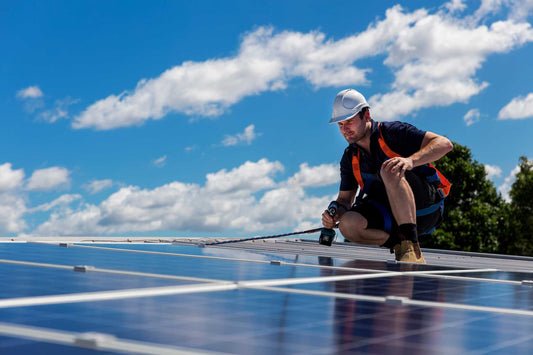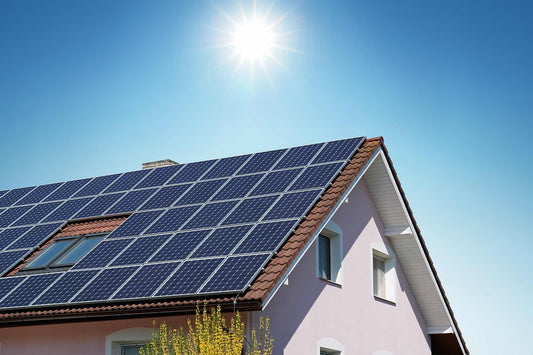If you’ve done any digging into the cost of installing a solar panel system, you’ve likely noticed that the price tag is not entirely consistent.
Every homeowner’s system will have a different price depending on a variety of factors, such as component quality, system size, installation method, and location.
Give our solar panel cost calculator above a try to estimate the cost of your system, or read on for a breakdown of the cost of solar panels.
How Much Do Solar Panels Cost?
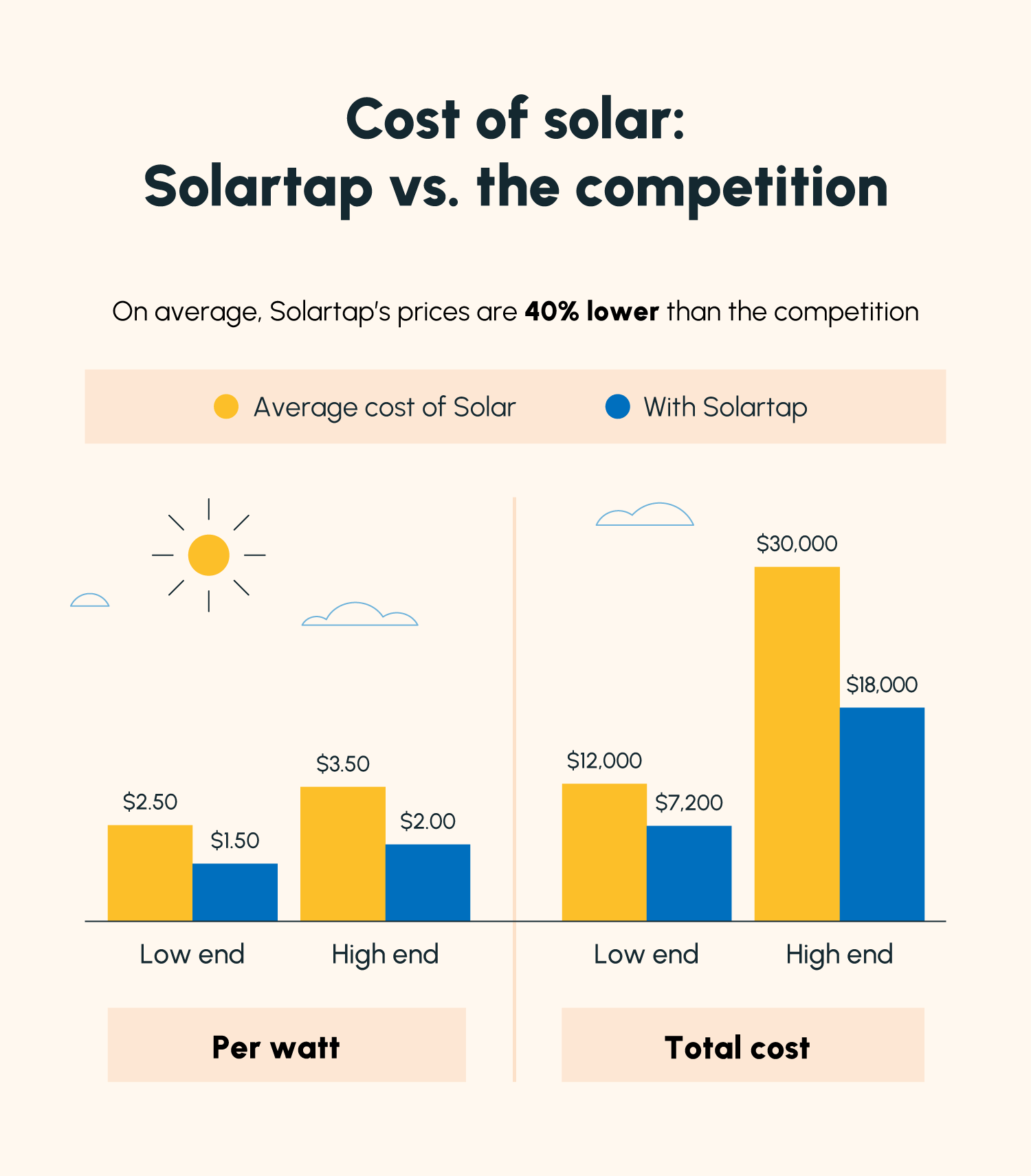
Installation costs aside, solar panels alone range in price from about $0.80 per watt up to $1.50 per watt depending on their performance, durability, and warranty, among other factors.
The average professional solar panel system installation, on the other hand, costs between $2.50 and $3.50 per watt, or between $12,000 and $30,000 total (before incentives).
With Solartap, these numbers are significantly lower, with total cost including installation falling between $1.50 and $2.00 per watt, or $7,200 and $18,000 total (before incentives).
| Solar system size | Average cost ($) | Solartap's cost ($) |
|---|---|---|
| 2 kW | $6,000 | $3,600 |
| 4 kW | $12,000 | $7,200 |
| 6 kW | $18,500 | $11,100 |
| 8 kW | $24,500 | $14,700 |
| 10 kW | $30,000 | $18,000 |
Data courtesy of Modernize.
If these prices seem better than what you heard a few years ago, your gut is correct — the average cost to install solar has been cut in half in the past decade alone.
Better yet, it’s continuing to trend downward, with the Department of Energy (DOE) aiming to reduce the cost of solar energy by 60% in the coming decade. With incentives like the Federal Solar Investment Tax Credit offering a 26% tax credit on systems built in 2022 (and 22% on systems built in 2023), the time to go solar is now.
Factors Impacting Solar Panel Cost
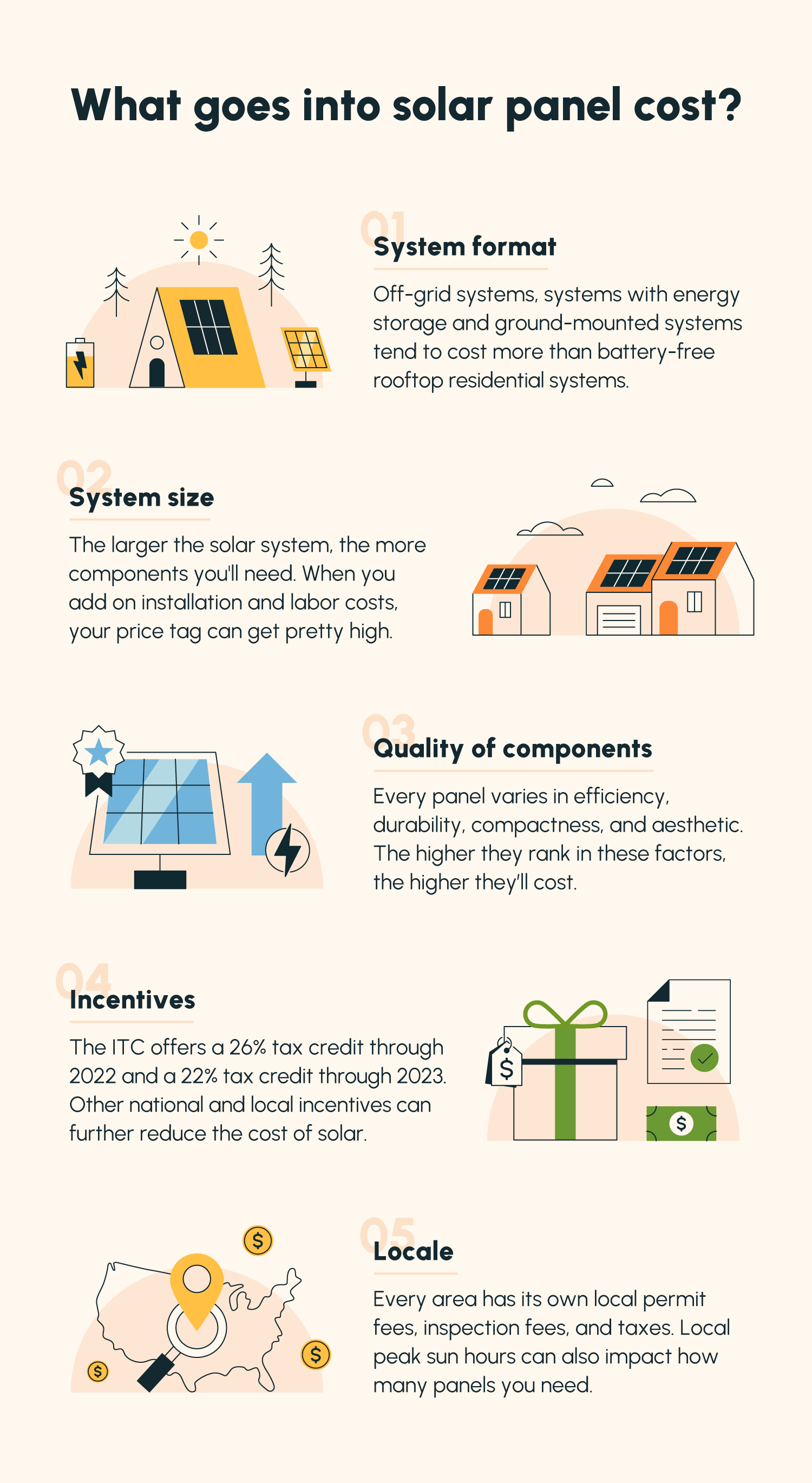
As mentioned previously, solar panel cost is dependent on a lot of factors. We unpack the most significant ones below.
Type of System
You can customize your system depending on your individual situation in several ways, each of which can impact your total cost. These include:
- Proximity to the grid
- Energy storage needs
- Mounting method
If you live close to the electric grid, you’ll likely want a residential (also known as grid-tied) solar system. If you live far from the grid or live a more nomadic lifestyle, you may want to look into an off-grid system.
Homes with residential solar systems have access to the grid, meaning they don’t need to rely entirely on solar to meet their electricity needs — during times of low production, they can pull from the grid.
Off-grid living, on the other hand, doesn’t offer this luxury. Most people living away from the grid rely entirely on their solar system for their electricity and therefore often need to invest in higher-efficiency panels, as well as a greater quantity of panels.
Approximate cost additions of various system configurations
| Off-grid | Energy storage | Ground-mounted |
|---|---|---|
| + 100-180% | + 50-100% | + 20-40% |
Data courtesy of Fixr.
And then there’s energy storage. If you want to be able to store extra energy collected during sunny hours to use during off-hours, you’ll need to invest in batteries. Batteries for solar power — the most popular being lithium ion — are very expensive, and they’re pretty necessary for anyone living off-grid.
Lastly, there’s your mounting method. For example, if your roof isn’t suited for solar panels, you may consider ground-mounted solar. This installation method is pricier than rooftop solar due to the materials and labor needed.
System Size
It should come as no surprise that the more solar panels you purchase, the more expensive your system will be. This is not only due to higher panel component costs, but also higher installer margins. After all, more equipment means more labor for the installer.
Your system size tends to correlate with your monthly electricity usage, but other factors like peak sun hours in your area also play into how many solar panels you’ll need.
Check out our post on sizing a solar system to estimate your own system size.
Equipment Quality
Cost breakdown for 6 kW and 10 kW solar panel systems
| Expense | Share (%) | Share ($) for a 6 kW system | Share ($) for a 10 kW system |
|---|---|---|---|
| Solar panels | 12% | $2,220 | $3,600 |
| Inverter | 7% | $1,295 | $2,100 |
| Balance of system (BOS) | 13% | $2,405 | $3,900 |
| Equipment supply chain costs | 15% | $2,775 | $4,500 |
| Installer margin | 23% | $4,255 | $6,900 |
| Sales & marketing | 12% | $2,220 | $3,600 |
| Installation labor | 11% | $2,035 | $3,300 |
| Permitting & inspection | 4% | $740 | $1,200 |
| Sales tax | 3% | $555 | $900 |
| Total | 100% | $18,500 | $30,000 |
Data courtesy of What Next Now.
It’s no secret that quality comes with a price tag. The more compact, durable, efficient, and aesthetically pleasing a panel is, the more it’s going to cost. If one panel’s cost per watt is higher than another’s, it’s probably because it’s sleeker and more space-efficient.
In addition to the panels themselves, the quality of other components you choose can raise or lower the cost of your system. For example, your choice of inverter(s) is very important, with traditional string inverters usually costing less than more advanced microinverters or hybrid inverters.
If you’re unsure which solar inverter is right for you, check out our post comparing your inverter options.
Solar Incentives
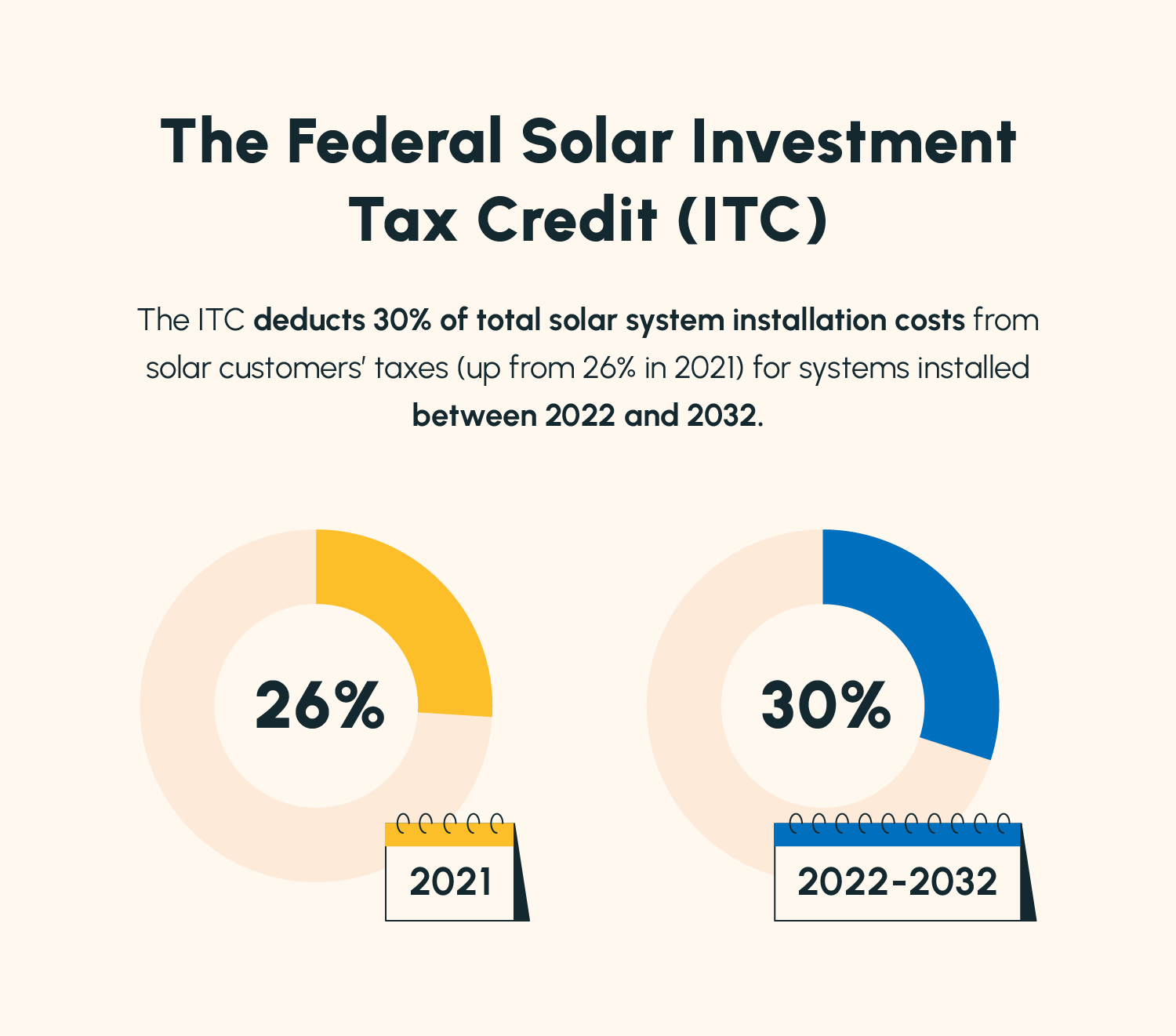
In an effort to expand the number of homes with solar, the national government and many local governments provide incentives for installing solar systems.
The most significant of these is the Federal Solar Investment Tax Credit (ITC), a 30% tax credit provided to homeowners who install solar through 2032. Essentially, homeowners will have 30% of what they paid for their system returned to them as a tax credit.
Location
The cost of solar panel installation can vary slightly depending on where you live due to permit fees, inspection fees, and local taxes. Your location also determines what incentives are available to you.
For example, some states will provide monetary incentives for generating a certain amount of solar energy, and others will pay you to contribute some of that electricity to the grid. Check what incentives are available in your area and claim whatever you can.
Cost of Solar Panels FAQ
There’s a good chance that what you pay for your solar system won’t be the same as what your neighbor pays — the cost of solar isn’t uniform. This can make solar cost a confusing topic. Below, we answer some common questions about buying solar.
How Much Does It Cost to Install Solar Panels?
Before applying any incentives, the average solar panel system installation costs between $2.50 and $3.50 per watt, or between $12,000 and $30,000 total.
Solartap’s middle-man-free strategy, however, cuts total costs by about 40%, bringing the price down to between $1.50 and $2.00 per watt, or $7,200 and $18,000 total.
How Many Solar Panels Do I Need to Fully Power My House?
The average American household would need about a 6 kW system to power the entire home. Assuming a panel wattage of 325 W, it would require about 19 panels to fully power a house.
That said, the number of solar panels you need depends on several factors, the most important being your household electricity use. It should go without saying that the more energy you use, the more solar panels you’ll need to fully replace the energy you’ve been purchasing from your utility company.
Is Solar Worth It?
Yes — solar is almost always worth the investment, as long as you buy rather than lease your panels. The average payback period (around six to eight years) is usually less than half of the solar system’s lifetime (25-30 years), making the ROI of a system very high, no matter where you live.
Due to Solartap’s low-cost model, you can expect your payback period to be even shorter than the average solar provider, meaning your panels will pay for themselves in no time.
Estimate your payback period and overall cost of installing solar using our solar cost estimator above, or get a quote from Solartap today using our solar calculator.


